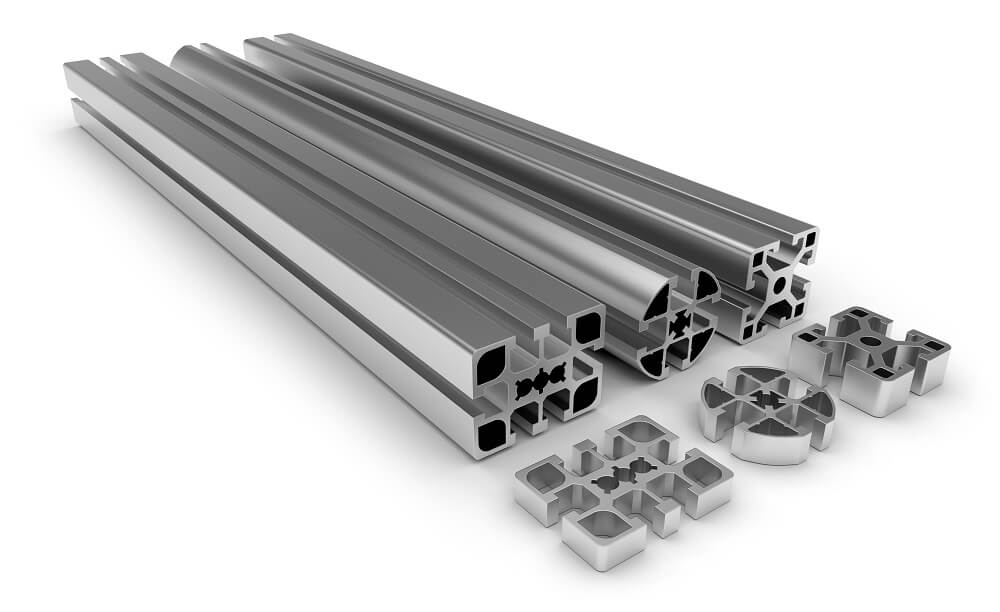When a designer specifies aluminum extrusion fabrication, he gets two sets of advantages; first the extrusion process, and second those inherit in aluminum.

The extrusion fabrication process is usually the most economical way to make parts that have a constant cross section, because the designer can put the metal “where he wants it.” Often, extruding is the only method that can be used.
Machining many lengths of metal to particular cross section is almost always more costly than extruding a similar number of pieces. Machining costs are additive; each additional piece requires almost that same amount of time and labor. Scrap resulting from machining often weighs more than the finished work.
Fabricating shapes by welding is also costly. Each work piece must be welded and costs do not decrease much with volume. In some instances the cost of the necessary welding jigs is much higher than the cost of the extrusion die that would be necessary to produce the same shape.
The cost of roll forming dies is very high compared to extrusion dies. Additionally roll forming cannot be used where wall thickness must be varied. The thickness of the metal remains the same after bending.
Sand and permanent-mold casting results in parts that may need extensive finishing before use. Aluminum extruding produces a wrought structure with relatively close dimensional control. Casting mold costs rise far more rapidly than extrusion dies as part complexity increases.
Extrusion dies are comparatively inexpensive. Generally, a simple shape will cost only a few hundred dollars. Forming dies and casting models generally run to thousands of dollars.
More extruders stock many standard dies, which the customer can use without a die service charge. Extrusion dies can be finished with less lead time than forming dies and casting molds.
Aluminum extruders will also store and maintain the die without charge. Most aluminum extrusion dies can be installed in a press quickly, so set up charges are nominal. Extrusion die life is long.
While many metals can be extruded, aluminum is the best all around extrusion metal because of its unique combination properties.
High Strength-to-Weight Ratio
Because the extrusion process “puts the metal where it is needed,” the result is a very strong part with relatively low weight.
Lightweight
The weight of aluminum is approximately one-third that of copper or brass or steel.
Corrosion Resistant
Aluminum has exceptionally good corrosion-resistance properties. It is self-protected by its own thin, transparent oxide film. Aluminum’s natural protective properties and color can be enhanced by chemical or electrochemical means.
Machines at High Speed
Aluminum is normally machined at speeds of 600 to 700 surfaces per minute and can usually be machined on standard equipment. Special lubricants, cutters and tools have been developed for aluminum to permit machining at even higher speeds.
Easily Joined
Aluminum alloys can be joined by welding, brazing, soldering, adhesive bonding, mechanical fastening by stakin, as well as by the use of nuts, bolts, rivets, etc.
Formed Easily
Extruded shapes can be formed or bent using conventional equipment. Minimum radii and other specific points depend on a number of considerations: alloy, wall thickness, temper and shape.
High Electrical Conductivity
On a weight-to-weight basis, aluminum carries twice the current of copper. On a size-to-size basis, aluminum carries two-thirds the current of copper at considerably lower cost.
Excellent Thermal Properties
Aluminum is both a good heat conductor and a good heat reflector. Its ability to conduct heat is almost equal to that of the best conductors: silver, copper, and gold. Because of its ability to conduct heat, aluminum is used in heat transfer applications. And, because aluminum is also highly light reflective, it is used as a heat shield.
Getec Industrial is one of North America’s leading custom aluminum extrusion companies for custom and standard aluminum extrusions. As part of our aluminum extrusion turnkey manufacturing program, we also provide aluminum die casting services and thermal management solutions.